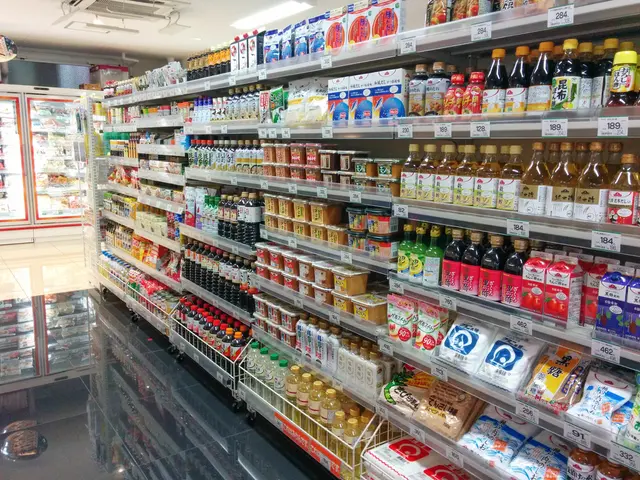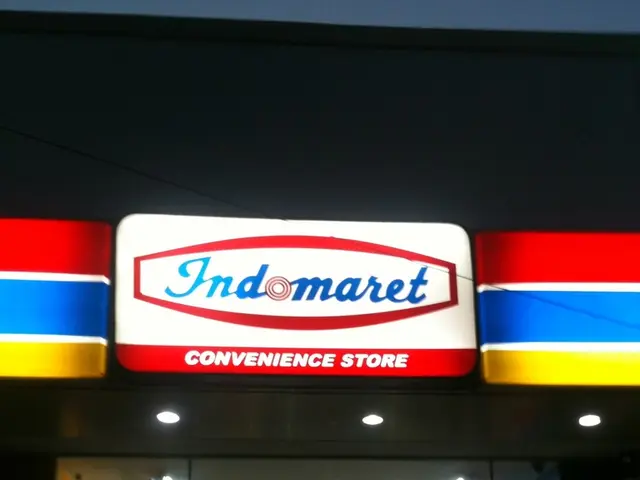The ongoing battles between Aldi and Lidl in the German discount store market
Competitors vying for top position in discount retail sector - Competing discounts vying for market dominance
Discount stores continue to be popular in Germany, with Aldi and Lidl leading the charge. In 2024, these two titans generated a staggering turnover of around 77 billion euros, a massive 33% increase from five years prior [source: German Press Agency]. YouGov's market research data reveals the intense competition in the sector, with discounters like Penny, Netto, and Norma also seeing growth that outpaced the entire market.
The food retail sector witnessed a 26.6% increase in turnover between 2019 and 2024, reaching approximately 203 billion euros [source: YouGov]. Supermarkets like Edeka and Rewe also experienced growth during this period, though at a similar rate. In 2024, discounters accounted for 38% of the market share, while full-range retailers held almost 29% [source: YouGov].
Notably, both groups gained market share during the COVID-19 pandemic and the Russian invasion of Ukraine. In 2024, however, the shift towards discounters has stopped, with full-range retailers catching up [source: Robert Kecskes, YouGov expert].
The fight for market dominance is evident in the price wars between Aldi and Lidl. Recently, both retailers have slashed prices, with Lidl announcing its "biggest price reduction in history" and Aldi following suit [source: Lidl and Aldi]. Stephan Rüschen, a retail expert from the Dual University of Baden-Württemberg, believes that these price cuts could be permanent due to the increased scrutiny on companies that raise prices again [source: Stephan Rüschen].
ALDILidlDiscount StoresCompetitionGermanySustainabilityAldi NordAldi SüdRobert KecskesYouGovPennyNettoNormaEDEKAReweCoronavirusUkraineStephan RüschenFull-range retailersInflation
Enrichment Data
Aldi and Lidl's sustained growth strategy
Aldi and Lidl's strong foothold in the German market is maintained through their continuous focus on:
- Low Prices: Maintaining competitive, budget-friendly prices is a top priority.
- Expansion: Both chains continue to expand in new markets, with Aldi Süd especially noted for its sustainability efforts.
- Non-Food Offerings: Lidl has expanded its product range to include DIY and sports brands.
Adapting to challenges
Both Aldi and Lidl adapted to the challenges posed by the COVID-19 pandemic and the Russian invasion of Ukraine:
- Supply Chain Enhancement: Efforts were made to improve supply chain resilience and maintain product availability.
- Digital Integration: Aldi and Lidl enhanced their digital presence to some extent, though the focus remains on in-store sales.
Strategic Focus
Aldi and Lidl's long-term strategies include:
- Sustainability Efforts: Aldi Süd ranks highly in sustainability rankings, emphasizing its commitment to environmental responsibility.
- Maintaining Price Leadership: Both chains aim to maintain low prices to be perceived as the cheapest providers by consumers.
- International Expansion: Lidl has been aggressive in expanding to international markets [source: YouGov].
In conclusion, Aldi and Lidl's ongoing price wars and expansion strategies solidify their positions in the German discount store market, with an evolving emphasis on sustainability and non-food offerings.
- Sustainability efforts, such as those of Aldi Süd, play a significant role in Aldi and Lidl's expansion strategies.
- Both Aldi and Lidl have expanded their product range to include non-food offerings, like DIY and sports brands.
- The discount store industry, including Aldi and Lidl, saw impressive growth between 2019 and 2024, with market research data revealing intense competition among establishments like Penny, Netto, and Norma.
- In the German retail sector, full-range retailers, such as Edeka and Rewe, also experienced growth, though at a slower pace compared to discount stores, which accounted for 38% of the market share in 2024.
From the given data, Aldi and Lidl's sustained growth strategy is focused on low prices, expansion, and the offering of non-food products. They have also adapted to challenges by improving supply chain resilience and enhancing their digital presence, though the emphasis remains on in-store sales. Their long-term strategies include sustainability efforts, maintaining price leadership, and international expansion, with Lidl being particularly aggressive in expanding to international markets.








